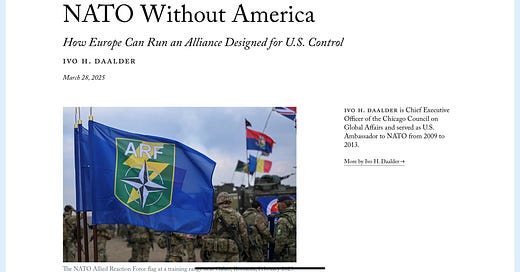This Friday, NATO members will mark the 76th anniversary of the signing of the North Atlantic Treaty in Washingon, DC. Not a few will likely wonder whether this is the final year they will celebrate an alliance that has secured peace on the long-wartorn European continent for more than three-quarters of a century.
NATO has witnessed many crises in hits long history, but for the first time it is facing an existential crisis. Never before has there been as profound an agreement on the threat that NATO seeks to deter and defend against. And never before has a member—let alone its principal security provider—cast doubt on the idea that its security is inextricably bound up with the security of the other members.
Until now. The United States joined Russia at the United Nations last month in rejecting a Ukrainian resolution, supported by all other NATO members and many dozens of other nations, calling for the aggressor to withdraw its forces from Ukraine. President Donald Trump has said the US won’t defend those allies who “don’t pay.” And Vice President JD Vance traveled to Munich last month to tell allied leaders that he feared Europe’s “enemy within” far more than Russia.
Europe has taken note. Its leaders have committed not only to beef up their defenses but to sharply reduce, if not eliminate, their reliance on the United States. That is the right response—one they should have taken many years ago. But Europeanizing NATO won’t be easy and certainly not quick. As I argued in a new piece published by Foreign Affairs, it will take three factors that are presently in short supply: money, time, and US cooperation.
I urge you to read the entire argument in the magazine. Here is a gift link to the piece.






In your article you write, "Not counting the United States, NATO’s other 31 members comprise a population of more than 600 million people as well as a collection of economic resources more than ten times those of Russia. These countries, despite having had to rely on the United States for so long, are fully capable of ensuring their future security for themselves. The time to start is now."
Economic resources MORE THAN TEN TIMES those of Russia. This is obviously very good news and allows us to imagine a future when Russia is fully contained within it's borders and is no longer a threat to Europe, other than Russia's nuclear arsenal. If true, then...
In coming years the threat from Russia may come less from it's imperialist ambitions than it does from an unraveling of Russia's primitive mafia state political system. Russia is scary in the same way that Pakistan is scary, it's a fundamentally unstable country, with nuclear weapons.
You write, "Its leaders (EU) have committed not only to beef up their defenses but to sharply reduce, if not eliminate, their reliance on the United States. That is the right response—one they should have taken many years ago."
Thank you. Agreed. And now on to...
As Democrats, this is an opportunity for us to demonstrate that we are intellectually honest, seeking unity where possible, and not just a mirror clone of a polarizing MAGA movement. We should give credit where credit is due. Donald Trump made this happen. That doesn't mean that Trump is a good person, or that anybody should become a Republican. It just means that on this particular issue, when Donald Trump claimed "only I can fix it", he was right. If we can credit him with that we'll be more credible when we need to challenge his policies.
As you say, the EU should have done this many years ago. And so we should view the EU taking these steps now as a good thing, an accomplishment, a victory for security in Europe, and beyond. The free world will be safer when both America and the EU are strong. This is a messy transition with some hurt feelings, but it's not a disaster, so we should dial back all the gloom and doom talk. The EU arming up is bad news for Putin. We should celebrate that.
As Democrats, it might be helpful for us to hold our nose about Trump long enough to observe how this victory was accomplished. Obama's Harvard law school polite and professional patient dialog with the Europeans didn't work. It took a disrupter to get us here. We should learn what we can from this on how we can be better disrupters.
I have confidence that once the Europeans roll up their sleeves and take care of necessary business we'll all be in a better position going forward.